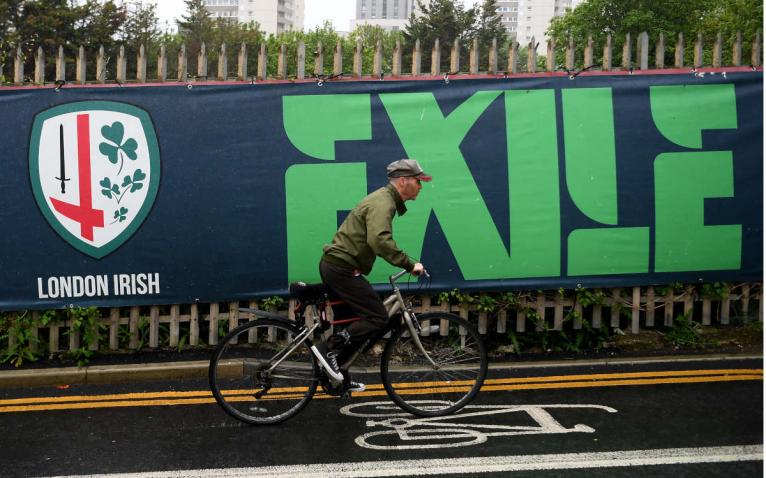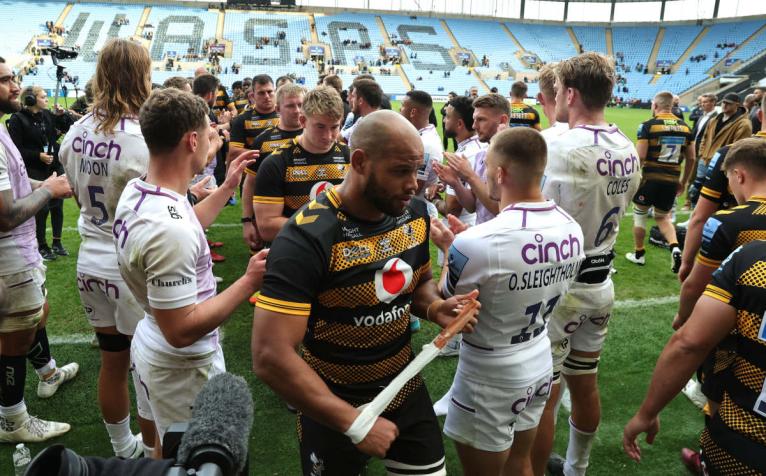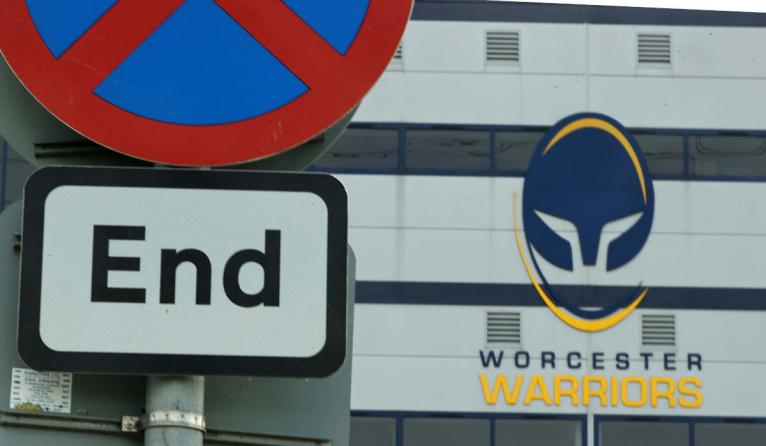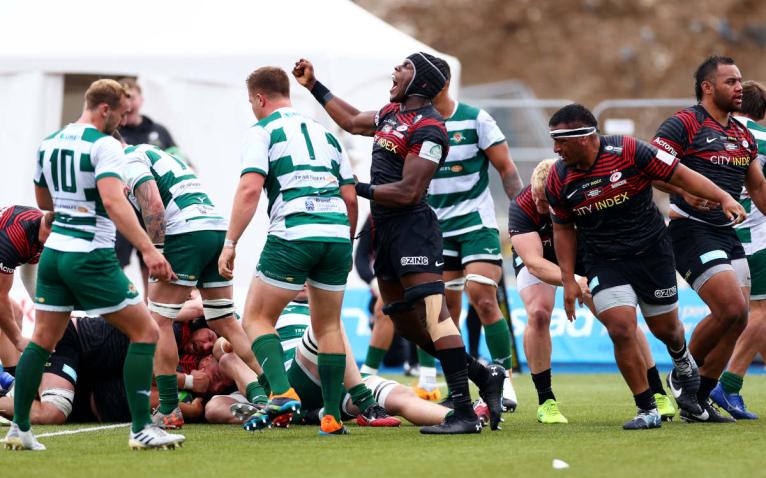When a cherished institution goes up in a puff of smoke, there is an emotional outcry. Wailing, heartache and sometimes an admission of guilt that more wasn’t done to keep an ailing business in the black. In this most ruinous of Premiership Rugby seasons, the unthinkable has happened. Not once, not twice, but thrice.
Three clubs, whose amateur roots date back to the 19th century, have had the cord cut because their flawed business models were adjudged to be unfit for purpose. Three clubs who flew too close to the sun gone, trying to keep up with rivals who had deeper pockets.
With the sad news of London Irish’s collapse last night, rival clubs are already circling their prize assets, Henry Arundell, Tom Pearson, Will Joseph and Ben Loader, but for all the starlets, there will doubtless be seasoned pros unable to find a club in a depressed labour market. Some will fall out of the game, some will head to more buoyant climes in France and Japan, and quite where this leaves professional rugby in England no-one is sure.
Word has spread for months that the club owners feel ten is the perfect number of teams for the Premiership and now they have their wish, but is anyone buying that a league which voted for expansion to 14 clubs only two years ago, has decided that having four fewer home games a season is the path to profit? Fewer games means fewer fans walking through the turnstiles and, on the face of it, no uplift in a new TV deal, which is set to be agreed in 2024. TNT (formerly BT Sport) are front-runners, but with little competition. They are under no obligation to boost rights with fewer games to market.

Premiership Rugby and its clubs will no doubt give the competition a new lick of paint and trumpet it as a new beginning, but can they truly say it’s ‘business as usual’? This is a scar on the game that will take some time to heal. Between 400 and 500 jobs lost, families uprooted and fans, many dating back several generations, disaffected with the game and feeling unloved, undervalued and unappreciated with a stark choice: turn their back on the game or choose to follow a rival side – which, for the avoidance of doubt, is not how fandom traditionally works.
The growing popularity of MMA and UFC, as combat sports, shows rugby cannot afford to rest on its laurels and in one of its most lucrative markets, England, it is reeling
Rugby considers itself a family, but three family members will not be lining up at the starting gate next season and if you had to surmise events over the past eight months, you cannot escape the fact it has been a systemic failure.
That the Department of Media, Culture and Sport has parachuted two administrators – Chris Pilling and Ralph Rimmer – into the English game to help ‘stabilise the future of professional rugby union’ is alarming and damning in equal measure. For anyone with a passing interest in the club setup, they would conclude rugby looks like damaged goods; a sport ailing. You see, no sport has a God-given right to survive, even if it’s 200 years old, as rugby is this year. There are always new sports to fill the attention gap for rapacious fans. The growing popularity of MMA and UFC, as combat sports, shows rugby cannot afford to rest on its laurels and in one of its most lucrative markets, England, it is reeling.

The RFU may be overlooking this mess like a disapproving auntie but their role must also be scrutinized. Yes, after overreaching themselves in 2016 with their £200m eight-year Professional Game Board (PGB) deal for Premiership Rugby, they may see less money having to be forked out when the deal is renegotiated next year, but that is to miss the point.
Their lack of financial support for the Championship has meant dropping into the league is effectively a death sentence to professional aspirations, with no hope of promotion and miniscule resources. The gap has become a chasm, and even if you are an ambitious club, such as Ealing Trailfinders or Jersey Reds, success in the league table is no guarantor of progression. Reinvesting and reconnecting with rugby’s second tier must surely be top of an extensive to-do list.
Without your own ground and modest gate receipts, a club finds itself running out of runway pretty damn fast.
The model implemented when rugby went professional – allowing rich benefactors to bankroll clubs – has proven flawed, because when an owner such as Irish’s Mick Crossan decides he no longer wants to lose money hand over fist, and if no new owner or conglomerate can be found, then it’s game over. Without your own ground and modest gate receipts, a club finds itself running out of runway pretty damn fast.
Post-pandemic, even clubs deemed to be on a stable financial footing, including Exeter Chiefs and Leicester Tigers, have seen choppy waters. Exeter had to sell their on-site hotel to stabilise finances, and Tigers’ owners needed to lump a £13m cash injection into the club to stave off administration. Newcastle Falcons have been cutting costs, and Sale Sharks’ owners have been publicly asking for more fans to visit the AJ Bell. It is all deeply worrying.

In hindsight, the rising of the salary cap to £7m, and the addition of two marquee players now seems reckless, but when CVC’s cash injection of £230m was agreed in 2019, ambition appeared limitless, yet the money soon dispersed into player salaries.
However, as is the case with private equity investment, they want their 27 per cent return on investment. If business is going fine, no problem, but when it’s not, the rules don’t change. It’s a politer case of Joe Pesci’s Tommy in Goodfellas: ‘Business is bad? F**k you, pay me. Had a fire? F**k you, pay me. The place got hit by lightning? F**k you, pay me’.
Indeed, it was financier Warren Buffett who famously said, ‘only when the tide goes out do you discover who’s been swimming naked’ and for Wasps, Worcester and London Irish, they’ve been caught with their metaphorical pants down. As RFU Chair Tom Ilube pointed out. “given the cost-of-living crisis, the post-Covid 19 bounce-back has been weaker than expected, and that has meant clubs with unsustainable business models have gone out of business – regrettably so for players and their fans.”
The academies have an uncertain future and the dream of becoming a professional rugby player got that much harder with roughly 150 fewer spaces to fill.
Fans like to think that amateur, Corinthian values still exist in professional sport, especially rugby, which is still experiencing growing pains 28 years after taking the leap into professionalism, but business principles of profit and loss, owing creditors and a competitive marketplace, mean there is no room for sentiment. Just ask Rotherham, Richmond or London Welsh. All famous, storied clubs who could not cut it in the shark-infested waters of the Premiership.
The knock-on effect of this annus horribilis will shake rugby to its core. The community clubs who feed into the stricken three no longer have a natural pathway to play for their local side. The academies have an uncertain future and the dream of becoming a professional rugby player got that much harder with roughly 150 fewer spaces to fill. London Irish has produced a plethora of England internationals; Anthony Watson, Jonathan Joseph and Joe Cokanasiga all started out at Hazelwood, and having watched the current crop of brilliant graduates, Irish are best in class, with one of the top catchment areas in England.

Simon Massie-Taylor, Premiership Rugby’s chief executive, is seen by many inside the game as a progressive, smart operator, who was, in effect, handed a hospital pass by the historical mistakes of his predecessors. The hope is that fundamental changes to the governance of a league on its knees will help map a more sustainable future.
Massie-Taylor’s closing statement struck an optimistic tone, but he also had a blunt message for rugby’s failed clubs. “As a league we are making significant progress in recalibrating so that Premiership Rugby prospers in the seasons ahead. In the meantime, if an owner decides to withdraw financial support for a club, we have limited options to keep it going.”
One can only hope the hard work is going on behind the scenes, and that after a high-profile World Cup, and a strong showing from England, the Premiership can emerge bruised, but with a brighter future ahead.


While this was certainly not the way to get there, 10 teams with an 18 match season is absolutely the way to go.
- Matches are more meaningful. Especially if we're scrapping relegation permanently or for a while, this helps. Every match, every try even, will count. Maybe you'll have a dead rubber in the very last week, but so few matches will help avoid that. Also should reform European qualifying, move those comps back to 20 each, with half of each league making it to the Champs Cup (so 5 Prem teams).
- It's better for players. Rugby is a dangerous sport. It always will be, and surely adult players accept that risk and that's fine. But 26-24-22 games then European matches? It's too much rugby. We're going to get high quality rugby with fewer matches.
- TV money is spread less. This one is obvious. You only have 10 teams splitting the TV revenue rather than 11, 12 or 14.
- Most importantly, eliminates clashes with international rugby. Look, international rugby is king. People are far, far less likely to watch let alone attend a Prem game on a Six Nations weekend, or even during Autumn Internationals when they'd rather watch England, and the big stars are missing anyway.
Again, we should have gotten here in a more organic way, but cutting back to 18 matches was 100% necessary and in the long run, everyone will likely be happy about that. I have no idea how France does it, but the amount of matches English clubs were playing was absurd.